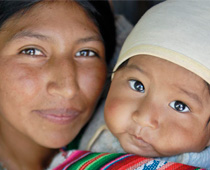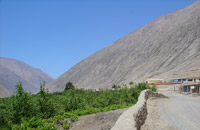


Read more:
Objectives of the
fair trade gold standards
The fair trade gold standards established by ARM are based around four major objectives, which form the keystone to the development of mining communities: social development, economic development, labour development and environmental development.
Social development
 The sale of fair trade gold must contribute to the development and quality of life of artisanal mining communities, which are comprised mostly of members or shareholders who are active miners. Accordingly, the income generated by this trade should benefit the miners and their families both socially and economically.
The sale of fair trade gold must contribute to the development and quality of life of artisanal mining communities, which are comprised mostly of members or shareholders who are active miners. Accordingly, the income generated by this trade should benefit the miners and their families both socially and economically.
These communities must also have a democratic structure and transparent governance. Therefore, all members and shareholders, with no discrimination with regard to membership or participation, must be able to exercise effective control over management, including all decisions concerning the allocation of profits. Like a private company, the organisation holds an annual general meeting of shareholders where the financial statements of the community are presented in a manner that is understandable and clear for all, prior to being approved.
Economic development
 In order to ensure their economic development, miner organisations selling fair trade gold must have access to the logistical, administrative and technical resources they need to bring high-quality products to market.
In order to ensure their economic development, miner organisations selling fair trade gold must have access to the logistical, administrative and technical resources they need to bring high-quality products to market.
The community collects and manages the fair trade - or development - premium, with complete transparency for both its members and ARM. This premium will be put into effect once the community has been certified. The organisation undertakes to use the fair trade premium in an appropriate fashion that contributes to the progressive increase of its economic strength. As such, the community agrees to work towards improving extraction techniques, using cleaner, more efficient technologies, to increase productivity and ensure the sustainability of its economic profitability.
labour development
 To reduce poverty and strengthen democratic governance, mining communities selling fair trade gold will apply the concepts of decent work, as defined by the International labour organisation (ILO).
To reduce poverty and strengthen democratic governance, mining communities selling fair trade gold will apply the concepts of decent work, as defined by the International labour organisation (ILO).
These standards generally seek to ensure a fair wage, safe workplace conditions and a mechanism for the social protection and mainstreaming of workers and their families. ARM and FLO have adapted this general framework to suit the needs of miner organisations, in order to establish a set of criteria that must be observed in order to obtain fair trade gold certification.
Thus, organisations producing fair trade gold undertake to:
- ban all forced or unpaid labour;
- eliminate workplace discrimination, particularly against female miners or specific social groups;
- abolish child labour and encourage social initiatives to promote education;
- guarantee health and safety conditions in the workplace, through protective equipment, training activities, etc.;
- establish social protection mechanisms;
- allow freedom of association, and the right to representation and collective bargaining;
- provide decent working conditions and wages.
Environmental development
 The environmental requirements of fair trade applied to the extraction of gold are intended to reduce the traditional risks and most significant environmental impacts induced by artisanal mining. These requirements have made it possible to establish priorities among the environmental challenges facing the mining communities, and to realistically imagine the reduction of their environmental impact in the short or medium term.
The environmental requirements of fair trade applied to the extraction of gold are intended to reduce the traditional risks and most significant environmental impacts induced by artisanal mining. These requirements have made it possible to establish priorities among the environmental challenges facing the mining communities, and to realistically imagine the reduction of their environmental impact in the short or medium term.
These organisations must therefore contribute, within their scope of action, to protecting the environment, the ecosystem and human health and to ecological restoration. Thus, when organisations use toxic substances in their mines and materials are discharged into the water and biodiversity is negatively affected by mining activities, measures must be taken to identify, measure, control, reduce and ultimately eliminate the adverse impacts.
These standards also include a higher category, defined in accordance with the standards established by Colombia's Green Gold Corporation. An additional premium, different from the fair trade premium, may also be tacked on, which can offset the economic losses attributable to a lower rate of gold recovery when processing techniques that do not involve mercury or cyanide are employed.

Last post of Patrick Schein's blog
Warning: DOMDocument::load(): Extra content at the end of the document in http://www.patrickschein.com/blog-en/?feed=rss, line: 2 in /home/goldbygold/domains/patrickschein.com/public_html/uk/news.php on line 28
Fatal error: Uncaught Error: Call to a member function getElementsByTagName() on null in /home/goldbygold/domains/patrickschein.com/public_html/uk/news.php:32 Stack trace: #0 /home/goldbygold/domains/patrickschein.com/public_html/uk/objectives-of-the-fair-trade-gold-standards.php(85): include() #1 {main} thrown in /home/goldbygold/domains/patrickschein.com/public_html/uk/news.php on line 32